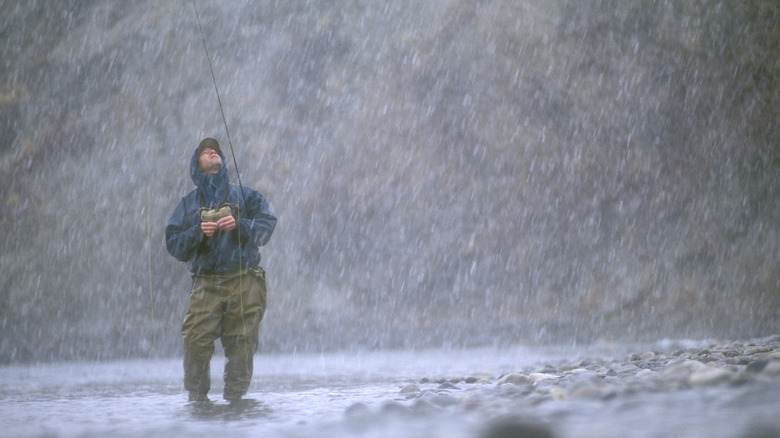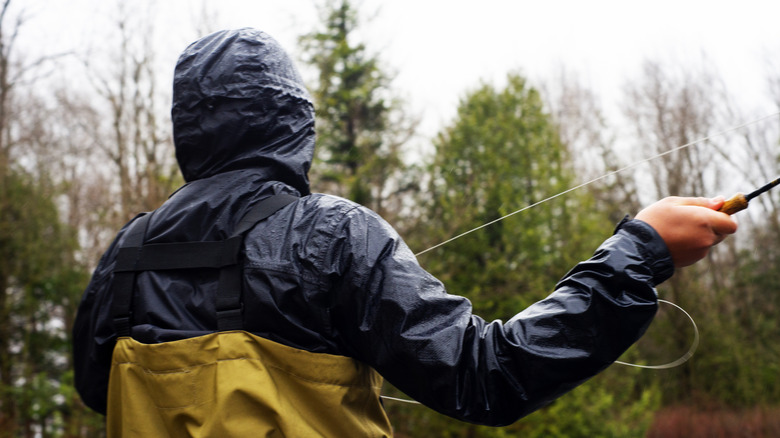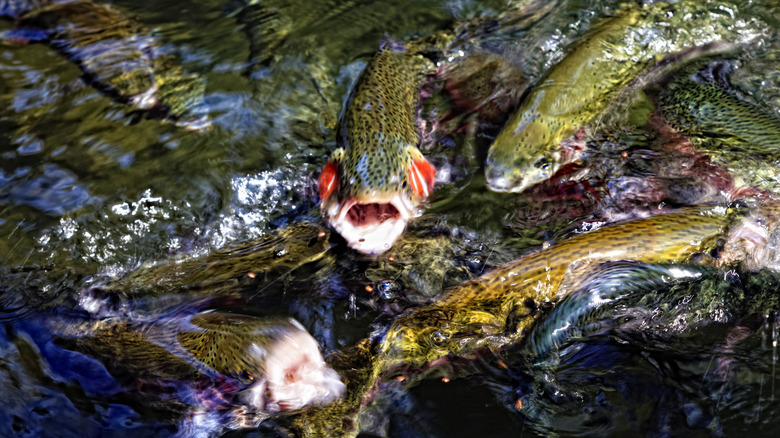Why Getting Rained On While Fishing Can Actually Be A Good Thing
We may receive a commission on purchases made from links.
Most people are familiar with "Singin' in the Rain," but what about fishing in the rain? While it is often said that fish are less active in the rain, the truth is that fishermen are more apt to be less active during a downpour. Fish, on the other hand, are often more active when the rain falls. So, although some may consider casting a line in the rain a fishing mistake to avoid, it can actually be a good thing.
Of course, there are reasons to avoid fishing in the rain. For starters, it can be dangerous. Weather is related to several of the most common ways people are injured or die while fishing. Docks, boat decks, and shorelines are often slippery when wet, leading to an increased risk of falls. If the rain is resulting from a thunderstorm, you have the increased risk of lightning strikes — and graphite fishing rods often attract such strikes.
Rain can also reduce your visibility. However, this can also be a bit of an advantage, as it also makes it more difficult for fish to see above the surface and, thus, less likely to spook after seeing you. Finally, fishing while soaking wet can be uncomfortable. However, if you are equipped with a Frogg Toggs Pro Lite Rain Suit or similar equipment, you can stay safe and dry — and take advantage of what is often excellent action while fishing in the rain.
Rain increases oxygen and cools water
Saying rain can help make fishing better is one thing. Understanding why is quite another. There are actually several things that happen when rain falls that can help increase fish activity. Two of the most important have to do with changes in oxygen level and water temperature that occur during a rainstorm. The dramatic changes rainfall can make to a fish's environment is the main reason rainy days can be among the best times to go fishing.
As rain hits the surface of the water, the resulting splashes and bubbles aerate the water. This increases the oxygen level in the water, which, in turn, leads to fish being more active. This can be a real game-changer during the heat of summer when there tends to be lower dissolved oxygen levels in water — especially in bodies of still water such as lakes, ponds, or slow-moving rivers.
Rain also tends to cool the water temperatures in all but the coldest of conditions. This is due to the influx of fresh water as well as the fact the rain falls from high in the atmosphere where temperatures are typically cooler. This is both more dramatic and impactful during summer, when water temperatures in lakes, rivers, ponds, and bays tend to be higher after sitting in the sun for long hours. In the dead of winter, the water temperature may not change much, if at all, from a shower. However, the oxygenation effect will still occur.
Fish can feed more easily in the rain
While higher oxygen levels and more comfortable water temperatures can help increase fish activity, rain also contributes to their ability to feed in several ways. For one, according to the National Oceanic and Atmospheric Administration, rain typically occurs during periods of low pressure. As most fishermen know, fish tend to feel more comfortable and feed more aggressively during periods of low pressure. For that reason, a lot of anglers have taken to wearing watches such as the Garmin Instinct-2 to track barometric pressure and weather conditions.
Another reason for fish feeding more easily in the rain has to do with visibility. Cloud cover and overcast skies bring fish closer to the surface. Essentially, the cloudy conditions darken the water, making predator fish more effective at concealing themselves from prey than during bright, sunny periods when everything is illuminated, particularly in the upper portion of the water column.
Finally, fish are able to feed more easily during rain because there is more to feed on. Aquatic prey such as minnows become more active during rain for the same reason the larger predator fish do — more oxygen and cooler temperatures. More active baitfish means more opportunities for predator fish. Additionally, other food items, such as insects and worms in freshwater settings and small crabs in saltwater environments, can wash into the water along with rain runoff, creating an entirely new foraging opportunity for fish.


